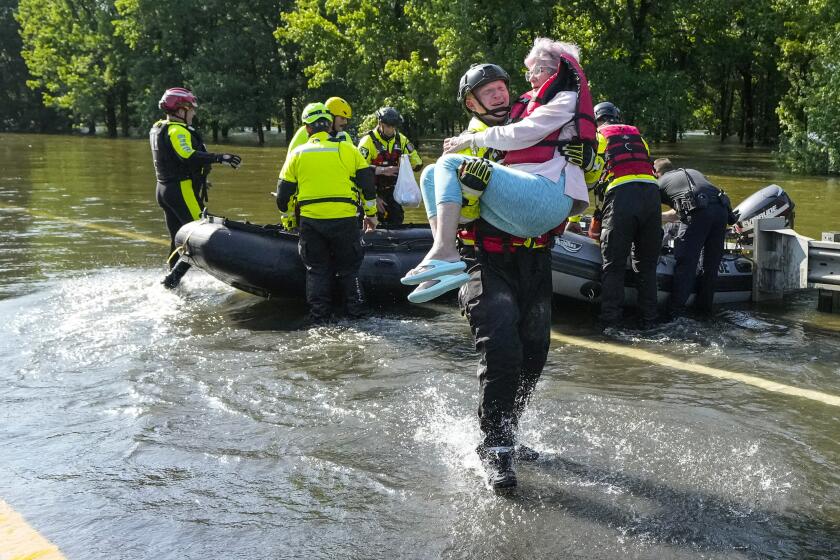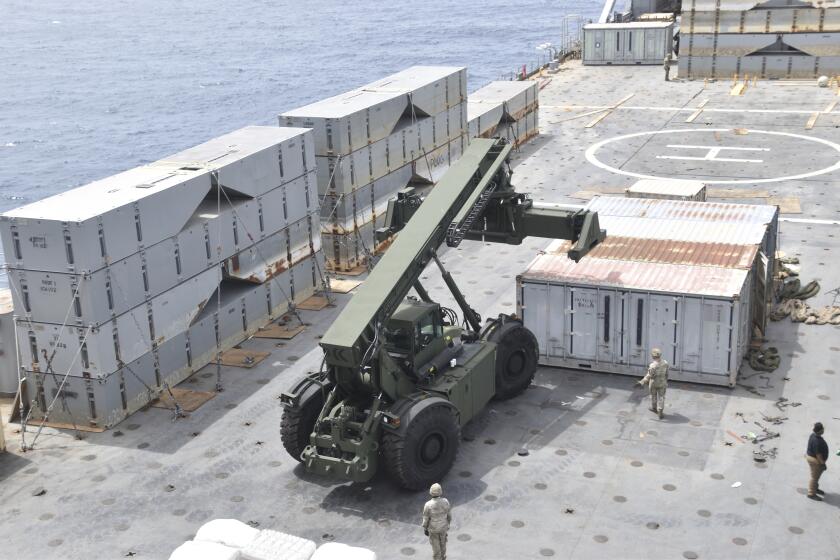Looters and the lessons of Katrina
Do you support the death penalty for minor thefts? Of course not. But what about your mayor and police chief? Will they, when the inevitable big earthquake hits Los Angeles or San Francisco, sometime in the next few decades declare open season on thieves?
It’s happened before. On the morning of the great San Francisco earthquake of 1906, the city’s previously progressive mayor issued a proclamation, printed up as a broadside and plastered throughout the city, authorizing law enforcers to “shoot to kill” looters.
You may want to dismiss this as the quaint barbarism of another age, but a scathing new report by the nonprofit investigative news organization ProPublica, PBS’ ” Frontline” and New Orleans’ Times-Picayune newspaper documents that five years ago, in the aftermath of Hurricane Katrina, New Orleans police officers were explicitly told that they could fire on thieves. As one captain put it to his officers at a morning roll call captured on videotape, “We have authority by martial law to shoot looters.”
In San Francisco in 1906, the police behaved pretty well, but then the U.S. Army marched in and imposed its own version of order. One man was bayoneted by a soldier after taking supplies at the invitation of the proprietor of a grocery doomed to burn. A bank cashier was shot trying to open his own bank’s safe. A man trying to rescue someone trapped in the rubble was shot dead after being mistaken for a looter. Estimates of those killed by the authorities run as high as 500, but actual numbers will never be known because the bodies of the killed were thrown into the flames and the bay.
During Hurricane Katrina, as investigative journalist A.C. Thompson’s work documented — and subsequent federal indictments charged — authorities again crossed far over the line. According to one indictment, in the chaotic days following the flooding, police officer David Warren shot an African American man, Henry Glover, because he might have been picking up some stolen goods. Glover’s brother and a good Samaritan took the bleeding man to a nearby school in their car, but rather than helping the gunshot victim, the U.S. attorney alleges, police there beat the men who transported him and then incinerated the car, reducing Glover, a father of four, to a few charred bones. The officers charged with killing Glover, burning his body and covering up their actions have all entered pleas of not guilty.
The Glover case was not an anomaly. The Times-Picayune and ProPublica documented numerous instances of police opening fire on citizens during the flooding, and 16 officers have been charged with crimes, including the shooting deaths of three people.
“Looting” is an inflammatory word that is equated with rampaging, marauding hordes and all the other cliches we’ve learned from disaster movies and overwrought media coverage of disasters. But most people behave well in disasters. If the crisis is prolonged, many of them engage in what I think of as foraging or requisitioning. You might too if L.A.’s electrical grid and economy were shut down by a disaster and there was no other way to get food, water, medicine and other vital supplies. Those things are not for sale in a major disaster; your credit card and often even your cash mean nothing. People take stuff, but it usually doesn’t look like the mob and panic scenarios the movies and the media tend to promote.
You’d choose picking up goods from a damaged chain store over watching children fade away from hunger or seniors go into crisis without their medications, wouldn’t you? To obtain urgently needed medical supplies, the head of a cable-car company and his attorney son became “looters” in San Francisco in 1906. Among those who “looted” in the flooded city of New Orleans days into the Katrina catastrophe were paramedics, tourists and an attorney stranded there after bringing his son to his first semester at Tulane University.
It’s probably been drilled into you that you should have emergency supplies — water, flashlights, etc. — for the next earthquake. But there’s more to survival equipment. Cities need to have policies on what will be expected of law enforcement in a disaster.
In New Orleans, the mayor chose to switch officers from search and rescue to protecting property from “looters,” even though thousands of residents were still stranded in the most dire conditions in modern American disaster history.
It was a decision that may have cost many lives. It’s one no mayor should ever make again. Those in charge presume that the public has gone berserk — that the crisis is not a hurricane or an earthquake but mobs rampaging in the streets — and that they need to “take the city back” or reimpose order at the point of a lot of guns. Ordinary citizens are turned into enemies — and corpses. Those who should protect and serve often act like an occupying army.
One of the things we can learn from Hurricane Katrina is that the people in charge need to prioritize human life over private property. They need to understand that most people actually behave with altruism, generosity, creativity and solidarity in a disaster, and that even those taking things from the wreckage of a shop may be engaging in necessary activities for survival. Officials need to make a firm commitment that we don’t have the death penalty without benefit of trial for minor property crimes — in ordinary times or extraordinary times.
Rebecca Solnit is the author of, among other books, “A Paradise Built in Hell: The Extraordinary Communities That Arise in Disaster.”
More to Read
Start your day right
Sign up for Essential California for news, features and recommendations from the L.A. Times and beyond in your inbox six days a week.
You may occasionally receive promotional content from the Los Angeles Times.






